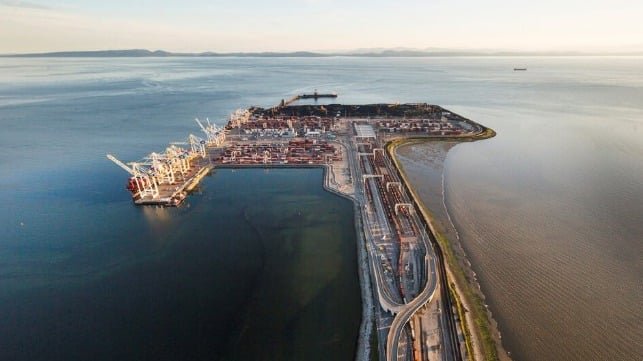The Vancouver Fraser Port Authority Announces Next Steps for Major Container Terminal Project
The Vancouver Fraser Port Authority is moving forward with plans to add a significant new container terminal to enhance Vancouver’s capacity and efficiency. They have initiated the search for a contractor for the mega terminal, aiming to select a firm with the necessary financial and technical expertise by the end of this year.
Despite facing challenges, including ongoing opposition to the controversial Roberts Bank Terminal 2 (RBT2) project, the port authority is determined to proceed with the $3.5 billion initiative. The project, approved by the Canadian government in April 2024, involves the construction of a new man-made island and a three-berth marine container terminal near existing port terminals at Roberts Bank in Delta, B.C.
Once completed, RBT2 is expected to add 2.4 million TEU of capacity, increasing Canada’s west coast container capacity by approximately one-third. The project is seen as a crucial component of the port of Vancouver’s long-term growth strategy, with the potential to enhance national supply-chain resilience and deliver significant economic benefits.
Despite facing opposition from local groups and environmentalists, the port authority is pushing ahead with the implementation of RBT2. The project includes the construction of a marine terminal fish passage, onsite habitat enhancement, and the South Arm Jetty Tidal Marsh project, among other components.
Interested companies have until the end of September to submit bids, with the port authority planning to shortlist three firms by the end of November. Construction of the terminal is scheduled to commence in 2028, with operations expected to begin in the mid-2030s.
Victor Pang, Vancouver Fraser Port Authority CFO, emphasized the importance of RBT2 in meeting Canada’s evolving trade needs and strengthening economic security. The terminal is positioned to support various sectors, including Prairie grain exports and B.C.’s forestry industry, while benefiting communities reliant on accessible and affordable goods.
The Port of Vancouver plays a pivotal role in Canada’s trade activities, facilitating transactions worth approximately $300 billion with up to 170 countries annually. The West Coast is anticipated to play an increasingly significant role in Canada’s future trade, particularly as the country seeks to expand its connections with Asian markets.
With the opening of new international opportunities, such as the recent launch of Canada’s first LNG export terminal near Vancouver, the country is poised to strengthen its trade relationships and foster economic growth.

